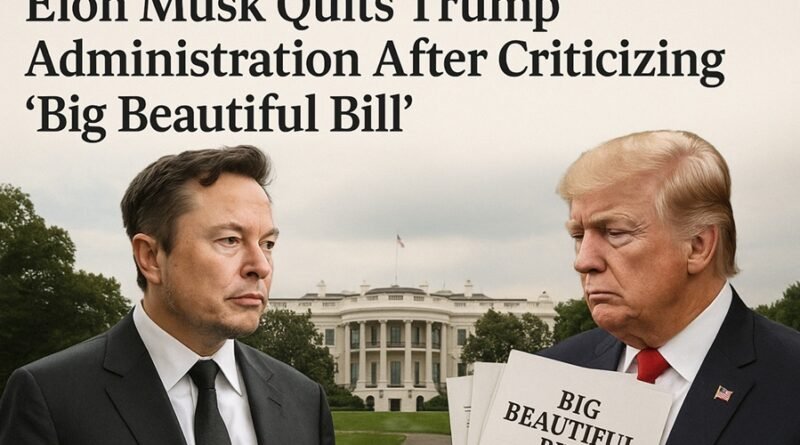Elon Musk Quits Trump Administration After Criticizing ‘Big Beautiful Bill’
Introduction
In a move that has stirred both the political and business landscapes, Elon Musk has officially resigned from his role as a Special Government Employee in the Trump administration. Musk, who was appointed to head the Department of Government Efficiency (DOGE), left after openly criticizing President Donald Trump’s new fiscal policy initiative, dubbed the “One Big Beautiful Bill Act” (OBBBA). The resignation is more than just a high-profile departure — it reflects deep ideological differences between a tech entrepreneur’s vision for lean governance and the political reality of big spending.
What Was Elon Musk’s Role in the Trump Administration?
Elon Musk’s appointment to lead DOGE — the Department of Government Efficiency — was part of Trump’s effort to bring business acumen into federal operations. Tasked with reducing government waste, increasing operational transparency, and modernizing systems with technology, Musk was seen as a disruptive innovator who could shake up Washington’s bureaucratic inertia.
Under his leadership, DOGE reportedly saved $175 billion by auditing outdated procurement practices, digitizing federal processes, and eliminating redundant agencies. Musk brought a Silicon Valley approach to public administration: agile, data-driven, and future-focused.
The “Big Beautiful Bill”: What Is It?
The bill that triggered Musk’s departure is formally known as the “One Big Beautiful Bill Act.” Introduced by Republican Representative Jodey Arrington, the legislation is a multi-faceted fiscal package that proposes:
- Extension of 2017 Trump-era tax cuts
- $150 billion increase in defense spending
- Rollbacks of clean-energy tax credits
- Reductions in certain federal oversight programs
While the Trump administration praised the bill as a “bold economic stimulus,” critics — including economists and climate advocates — argued it could balloon the national deficit and undermine environmental progress.
Musk’s Objection: A Clash of Principles
Musk did not mince words in his criticism of the bill. Calling it a “massive spending bill disguised as fiscal reform,” Musk argued that the OBBBA would undo much of DOGE’s progress by inflating the deficit and rewarding inefficiency.
His disapproval was especially focused on the rollback of clean-energy tax credits, a move that directly conflicted with Musk’s broader mission of accelerating the global transition to sustainable energy through ventures like Tesla and SolarCity.
Resignation Announcement and Aftermath
Elon Musk concluded his term as a Special Government Employee in May 2025, completing the maximum 130-day period allowed under federal law for individuals serving in such a capacity. He made the announcement through his platform X (formerly Twitter), stating that his “scheduled time” had ended. Musk also expressed appreciation for the opportunity to lead the Department of Government Efficiency (DOGE) and shared optimism about the continued impact of its reforms.
Though his official departure was framed as procedural, Musk’s recent public criticism of the Trump-backed “One Big Beautiful Bill” suggests that policy disagreements may have influenced the timing or tone of his exit. In a televised interview, Musk questioned the bill’s compatibility with DOGE’s mission to reduce government waste, indicating ideological divergence from the administration’s legislative priorities.
Trump’s Response
President Trump did not issue a formal press release specifically addressing Musk’s resignation. However, when asked about Musk’s criticism of the bill, Trump acknowledged during a campaign event that he had mixed views on the legislation, noting that while he was “not happy” with certain provisions, he was “thrilled” by others. The White House has not confirmed any major changes to the bill’s current structure following Musk’s comments.
Broader Implications for Tech in Politics
Musk’s departure sheds light on the challenges of integrating entrepreneurial innovation into the entrenched machinery of government. While business leaders often champion agility, disruption, and short feedback loops, federal policy is bound by consensus-building, compromise, and legacy systems.
This incident may have a chilling effect on other tech leaders considering political roles. It raises key questions:
- Can a private-sector mindset survive in public office?
- Is the federal bureaucracy too resistant to lean, tech-based reforms?
- How do political agendas accommodate — or reject — sustainable innovation?
What Comes Next?
For Elon Musk, the exit signals a return to his core companies — Tesla, SpaceX, Neuralink, The Boring Company, and the rising AI firm xAI. In the wake of his resignation, he reaffirmed his commitment to AI safety, sustainable energy, and interplanetary exploration.
As for the OBBBA, it faces a contentious journey through Congress. Analysts predict a fierce debate, especially around environmental and defense spending provisions. Musk’s public break from the bill may influence moderate Republicans and independents, particularly those with fiscal conservative leanings.
Conclusion
Elon Musk’s resignation from the Trump administration is not just another political headline — it represents a philosophical divergence at the heart of American governance. It is a debate between old-school fiscal expansionism and modern, efficiency-driven innovation. Whether Musk’s exit will prompt a course correction in Washington remains to be seen, but one thing is certain: the entrepreneur’s influence on public discourse remains as powerful outside the government as it was within it.

